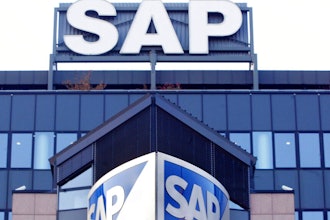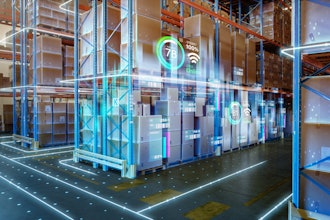
Supply chain disruption remains an ongoing challenge for the manufacturing industry, with labor and resource constraints continuing to dominate news headlines. Being resilient and able to adapt during these uncertain times is no longer progressive, it’s vital for economic survival. And some would argue it can only be achieved by embracing innovative technologies.
With the global cloud manufacturing market set to reach $207.59 billion by 2030, demand for cloud-enabled manufacturing processes has never been higher as companies pivot to keep pace with customer expectations for personalized products, deliveries, and services. For many digital-first manufacturers, the combination of cloud-based management platforms, such as ERP systems, with IIoT technology, provides the perfect opportunity to create smart operations in meeting new market and customer demands.
From design, engineering, and configuration processes to operational planning, production, delivery, and service, manufacturers can rely on the advanced capabilities of cloud-enabled manufacturing software working with IIoT technologies to drive innovation, efficiency and excellent customer experiences. The flexibility of cloud-enabled processes allow manufacturers to radically rethink how their supply chains function, end to end.
Taking Control
IIoT-enabled cloud manufacturing is drastically changing the traditional product design process, particularly when it comes to high-tech products made to a customer’s specification, or made following a customer’s own drawing package.
Yes, manufacturers need the flexibility of cloud technology to manage this time-consuming and labor-intensive process, maximize valuable resources, and improve supply chain flexibility. But the right IIoT-enabled cloud ERP systems can go even further by providing manufacturers with maximum control over the company’s planning and production processes – helping companies become more resilient to ongoing disruptions.
For instance, demand planning and mixed-mode manufacturing capabilities make it easier to alter the logistics equation for parts production. This allows organizations to develop faster prototypes and provide an alternative sourcing solution for lower volume production parts. When a manufacturer can source parts as demand dictates, they avoid buying and warehousing an excessive inventory.
Improving Sustainability Commitments
Sustainability is now at the top of the business agenda. Regulatory pressures, customer demands, investors, and recent legislative action, such as the cross-industry ripple effect of The Inflation Reduction Act and the Fair Repair Bill, have encouraged manufacturers to move to more sustainable processes.
Unlike the traditional “take-make-waste” linear business model where little consideration is given to extending and improving product lifecycles in the design process, cloud-enabled manufacturing can be a key enabler of the circular economy—helping organizations maintain, recondition, and recycle a product over an extended lifecycle. Environmental footprint management tools, incorporated into cloud ERP systems, can capture the footprint of a product over its lifecycle, providing comprehensive data for better decision-making.
Manufacturers can analyze the percentage of post-consumer waste used in a product to see where they can maximize the reutilization of components. This allows companies to overcome supply chain restrictions and preempt sustainability challenges.
The impact of distribution practices is another key area where cloud-enabled manufacturing can help companies take sustainable action one step further. With a recent Deloitte study stating that bulk carriers, oil tankers, and container ships account for around 85 percent of all shipping activity, manufacturers can use cloud-based platforms to address the industry’s heavy reliance on shipping and road freight—two areas that continue to be at the center of major supply chain disruptions.
For instance, cloud-enabled manufacturing supported by IIoT technologies can capture, catalog, and share granular data such as distance traveled, geographic coverage, and the number and length of breaks, across the entire value chain to help manufacturers optimize their loads and make necessary supply chain adjustments.
Ensuring Stronger Cyber Defenses
As software and applications begin to develop and improve at a rapid rate, so too does the threat of malicious attacks. Each year, cyberattacks cost U.S. companies $15.4 million and bring a total annual damage of $100 billion to the national economy. For manufacturers, the need to constantly maintain and update the latest security measures will be integral to ensure supply chain stability—and this is where cloud support comes in to deliver multiple benefits.
Manufacturers with the right cloud architecture will gain the highest level of control access. With a single-tenant architecture for instance, companies can benefit from greater management control and higher levels of isolation. This removal of access points allows manufacturing companies to significantly reduce the risk of data inadvertently falling into unauthorized hands.
Manufacturing and its sub-segments are a heavily regulated industry, with extensive data safety regulations and policies, from GDPR, NIST, and even ITAR for A&D manufacturers, so cyber security measures supported by cloud technologies are essential to protect critical business data. The right cloud solution can be tailored to certification specifications per industry, and allow companies to demonstrate that their IT infrastructure is compliant. This increased security support ensures that businesses can adhere to various data privacy and protection laws in their particular spheres of operation to ensure resilient supply chains.
Shortages of truck drivers, rising fuel prices, and finite raw materials will continue to play their part in ongoing disruptions. But IIoT-enabled cloud is redefining the supply chain. It will be critical in providing them with greater agility and flexibility across the entire manufacturing network. Forward-thinking companies won’t just be able to weather the storm, they’ll emerge stronger and more digitally-resilient once the disruption has cleared. Their cloud platform will help them stay ahead of impending challenges, providing a technology backbone and infrastructure which allows them to quickly pivot their business, whenever disruption occurs.
Andrew Burton is the Industry Director for Manufacturing at IFS.






















